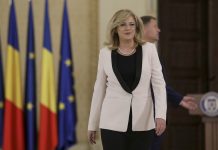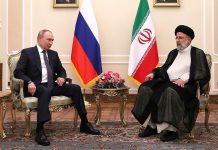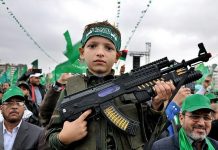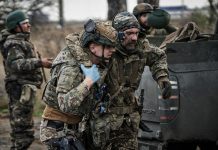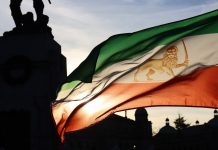It sounds like something out of a James Bond film: an undercover squad in Moscow trying to take down a continent.
But according to the New York Times, it’s frightening reality recently discovered by a handful of Western intelligence officials. The Times reports that an elite Russian military intelligence unit has been engaged for at least a decade in a campaign to destabilize Europe, citing intelligence officials in in four Western countries.
COVERT OPERATIONS
The report says GRU Unit 29155 reportedly oversaw a campaign to destabilize Moldova, an attempted assassination of an arms dealer in Bulgaria, a failed coup in the former Yugoslav republic of Montenegro and the poisoning of a Russian defector in Britain last year.
Russia’s Defense Ministry awarded bonuses to Unit 29155 in 2012 along with two others that were later suspected of involvement in the annexation of Crimea from Ukraine and the 2016 U.S. election interference.
“They were officers who worked undercover and as international agents,” The New York Times quoted unnamed retired GRU officer with knowledge of Unit 29155 as saying.
The retired officer said the Moscow-based Unit 29155 specialized in preparing for “diversionary” missions — “bombings, murders, anything” — in groups or individually.
MOLDOVA CONNECTION
According to the paper, which doesn’t provide many details, the unit tried to destabilize the former Soviet republic in 2014 when it held parliamentary elections. In June that year, Moldova signed an association agreement with the European Union, which irked Moscow. Russia then placed an embargo on Moldovan fruit, vegetables and wine.
Just ahead of November parliamentary elections, $1 billion was looted from three Moldovan banks in what was known as bank heist of the century. The EU has accused Moldova of not wanting to investigate the fraud, worth about 12 percent of the country’s GDP.
Moldova has not pursued the authors of the fraud, apart from fugitive oligarch Ilan Shor, but in the 2014 elections, the pro-Russian Party of Socialists emerged as the largest party in Parliament, winning 25 seats in the 101-seat legislature. The victory of the party, with young, outspoken members, was seen as a victor for Moscow, but the party, however, failed to form a government with other parties and a nominally pro-European coalition government was formed.
„UNSUCCESFUL” SUBTERFUGE
Although Western intelligence initially saw the events around Europea as unconnected apart from the links to Moscow, they now believe the elite group was behind the subterfuge.
The unit has operated “for at least a decade” but it’s “impossible” to know when and where its operatives will strike, the NYT quoted Western intelligence officers as saying.
Its known operations have largely been unsuccessful. Sergei V. Skripkal, a former Russian double agent who defected to Britain and the Bulgarian arms smuggler both survived their assassination attempts, while the 2016 coup attempt in Montenegro ultimately failed.
DIVERSE AND UNPREDICTABLE
A retired GRU officer with knowledge of Unit 29155 said that it specialized in preparing for “diversionary” missions, “in groups or individually — bombings, murders, anything.”
Western intelligence agencies first identified the unit after the failed 2016 coup in Montenegro.
However, the unit’s unpredictability and sloppiness could be “part of the game” of psychological warfare, the Times quoted former Estonian intelligence chief Eerik-Niiles Kross as saying. “They want to be felt,” he said.
But officials began to grasp the unit’s specific agenda of disruption only after the March 2018 poisoning of Skripal, a former GRU officer who had betrayed Russia by spying for the British. Mr. Skripal and his daughter, Yulia, fell seriously sick after exposure to a highly toxic nerve agent, but survived.
Ultimately, the British authorities exposed two suspects, who had traveled under aliases but were later identified by the investigative site Bellingcat as Colonel Chepiga and Alexander Mishkin. Six months after the poisoning, British prosecutors charged both men with transporting the nerve agent to Skripal’s home in Salisbury, England, and smearing it on his front door.
The purpose of Unit 29155, which has not been previously reported, highlights the degree to which the Russian president, Vladimir Putin, is actively fighting the West with hybrid warfare, a blend of propaganda, hacking attacks and disinformation, as well as open military confrontation.
SECRECY OR NOT?
Unit 29155’s commander, Major General Andrei Averyanov, was reportedly photographed in 2017 alongside one of the two suspects behind the poisoning of Skripal in Britain last year. While the photograph was not published, the report’s authors say its existence suggests that Unit 29155 is a tight-knight community. Western intelligence believes the unit is so secretive that other GRU members might not even be aware of its existence.
However, Russian investigative journalists have cast doubt whether Unit 29155 is that secretive, saying its address, as well as Averyanov’s information, can be easily found in a Google search, the Moscow Times reported.
Additionally, “attempts to frame it as some kind of all-Europe, all-roles kind of force sound [like] a little bit of a stretch,” Russian security analyst Mark Galeotti wrote.
“The members of the unit cited and the nature of the operations to which one can plausibly link Unit 29155 look to me much more indicative of a dedicated Spetsnaz special forces unit committed to mokrie dela, ‘wet work’ assassinations and sabotage,” Galeotti said.
The Kremlin referred The New York Times’ queries to the Defense Ministry, which did not respond to requests for comment.



